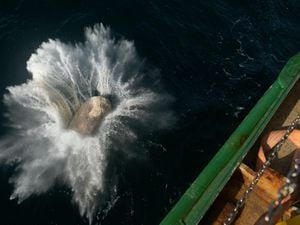Hugh Fearnley-Whittingstall puts name to boulder helping protect marine reserve
The campaigner has backed action by Greenpeace to create a boulder barrier to prevent damaging fishing in a protected North Sea site.

Broadcaster and campaigner Hugh Fearnley-Whittingstall has put his name to a boulder being dropped into a protected area of the North Sea to prevent damaging fishing.
Greenpeace has been dropping granite boulders at precise intervals inside the Dogger Bank protected area, to prevent destructive bottom trawling which drags heavy nets over the seabed that the area is designated to preserve.
The shallow sandbank habitat is home to crabs, starfish, flatfish and sandeels, which are food for seabirds such as puffins, as well as for porpoises and dolphins and fish such as cod.
Mr Fearnley-Whittingstall, who led a push to reform Europe’s fishing policies in 2012-2013 said he was putting his name to a boulder in Dogger Bank in protest at the weakness of the Government’s post-Brexit Fisheries Bill.
He called on the 800,000 people who signed up to his “fish fight” campaign to reform the EU’s Common Fisheries Policy, to call for better protection for UK seas after it leaves the European framework at the end of the year.
Campaigners want effective protection of marine reserves from destructive activities and for sustainability to be at the heart of future fishing policy when the UK becomes an independent coastal state.
Mr Fearnley-Whittingstall said: “This week a boulder with my name on it will be dropped by Greenpeace on the Dogger Bank.
“I’m proud to take part in this action to help prevent unlawful and highly damaging trawling and dredging on one of the most important Marine Protected Areas in our seas.
“The new Fisheries Bill needs to live up to its promise to protect our seas and allocate the post Brexit fisheries opportunities in a truly sustainable way that favours small scale inshore fishermen.
“All our Government’s bold talk of ‘taking back control’ of our fisheries will amount to nothing if our marine reserves remain ‘paper parks’ without proper protection, our fish stocks are not sustainably managed, and our fish are given away to foreign-owned fishing vessels and not the homegrown inshore fleet that will look after them best.”
Chris Thorne, oceans campaigner at Greenpeace UK who is on board the environmental group’s vessel Esperanza, which is dropping the boulders, said: “Our Government needs to step up and properly protect our oceans.
“What use are marine protected areas, when they don’t actually protect anything?
“Our new boulder barrier in the Dogger Bank, when completed, will close off almost 50 square miles of this vitally important ecosystem to destructive bottom trawling, which is ripping up and destroying the supposedly protected seabed.”
Greenpeace said it had commissioned an independent scientific agency to conduct an environmental impact assessment that concluded placing the boulders would not have a significant impact on the protected feature of the Dogger Bank.
Charles Clover, executive director of the Blue Marine Foundation, which fights overfishing, said the Government was facing direct action from Greenpeace, campaigning from Hugh Fearnley-Whittingstall, and legal action from Blue if it allowed damaging vessels to “trash British public assets” after January 1.
He called on Environment Secretary George Eustice to include a duty to prevent overfishing in the Fisheries Bill.
And he said: “He should reflect that 49% of fishing opportunities are owned by foreign industrial fleets and that British inshore fishermen want a fair Bill that looks after their interests and not those of the Dutch.
“Our inshore fishermen want the protection of offshore marine protected areas such as the Dogger Bank because they save fish.”





